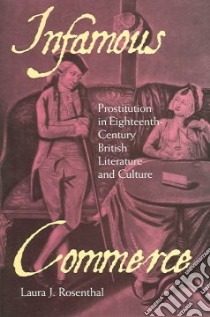Infamous Commerce - 9780801444043
Un libro in lingua di Rosenthal Laura J. edito da Cornell Univ Pr, 2006
- € 56.60
- Il prezzo è variabile in funzione del cambio della valuta d’origine
In Infamous Commerce, Laura J. Rosenthal uses literature to explore the meaning of prostitution from the Restoration through the eighteenth century, showing how both reformers and libertines constructed the modern meaning of sex work during this period. From Grub Street's lurid "whore biographies" to the period's most acclaimed novels, the prostitute was depicted as facing a choice between abject poverty and some form of sex work. Prostitution, in Rosenthal's view, confronted the core controversies of eighteenth-century capitalism: luxury, desire, global trade, commodification, social mobility, gender identity, imperialism, self-ownership, alienation, and even the nature of work itself. In the context of extensive research into printed accounts of both male and female prostitution—among them sermons, popular prostitute biographies, satire, pornography, brothel guides, reformist writing, and travel narratives—Rosenthal offers in-depth readings of Samuel Richardson's Clarissa and Pamela and the responses to the latter novel (including Eliza Haywood's Anti-Pamela), Bernard Mandeville's defenses of prostitution, Daniel Defoe's Roxana, Henry Fielding's Tom Jones, and travel journals about the voyages of Captain Cook to the South Seas. Throughout, Rosenthal considers representations of the prostitute's own sexuality (desire, revulsion, etc.) to be key parts of the changing meaning of "the oldest profession."
Informazioni bibliografiche
- Titolo del Libro in lingua: Infamous Commerce
- Sottotitolo: Prostitution in Eighteenth-Century British Literature And Culture
- Lingua: English
- Autore: Rosenthal Laura J.
- Editore: Cornell Univ Pr
- Collana: (Hardcover)
- Data di Pubblicazione: 08 Gennaio '06
- Genere: LITERARY CRITICISM
- Argomenti : English literature 18th century History and criticism Prostitution in literature Prostitution Great Britain History 18th century
- Pagine: 288
- Dimensioni mm: 228 x 152 x 19
- ISBN-10: 0801444047
- EAN-13: 9780801444043


